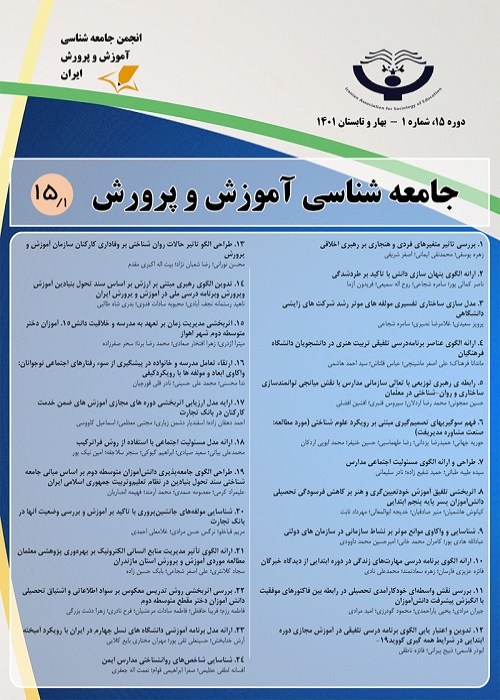Designing a Policy-Making Model in order to Teachers' Professionalism Empowering and Promoting by Relying on In-Service Training
The teachers' professionalism empowerment and promoting through in-service training can play an effective role in improving the quality of their education. Therefore, the purpose of this study was to design a policy-making model in order to teachers' professionalism empowerment and promoting by relying on in-service training.
In an applied study from type of qualitative, the present research was conducted on 10 professors and experts in the fields of education management and in-service training and empowerment who were selected according to the principle of theoretical saturation and with a purposive sampling method. The tool of the current research was a semi-structured interview that was conducted in the seasons of Farvardin to Shahrivar of 1401 year and its validity was confirmed by the triangulation method and its reliability was obtained by the agreement coefficient method between two coders at 0.92. The data obtained from the semi-structured interview were analyzed with using the content analysis method according to the grounded theory in MAXQDA software.
The findings showed that the policy-making model in order to teachers' professionalism empowerment and promoting by relying on in-service training had 174 indicators, 31 components in six fields of causal conditions, central phenomenon, background conditions, intervention conditions, strategies and consequences. In this research, the causal conditions were includes 13 indicators and 3 components of the social needs, changes in educational needs and creation of individual needs in teachers, the central phenomenon were includes 11 indicators and 3 components of the scientific and practical education, solving problems and creating value, background conditions were includes 18 indicators and 5 components of the correct implementation of courses, richness of the content of courses, competent environment, correct planning and teachers' mentality, intervention conditions were includes 59 indicators and 6 components of the non-committed and non-specialist managers, incorrect performance evaluation, incorrect needs assessment, lack of quality of course teaching, non-traditional teaching methods and weak motivational system, strategies were includes 46 indicators and 10 components of the successful modeling, improving the content of courses, region-oriented planning, accurate and scientific needs assessment of courses, removing teachers' individual obstacles, changing in educational systems, improving
- حق عضویت دریافتی صرف حمایت از نشریات عضو و نگهداری، تکمیل و توسعه مگیران میشود.
- پرداخت حق اشتراک و دانلود مقالات اجازه بازنشر آن در سایر رسانههای چاپی و دیجیتال را به کاربر نمیدهد.



